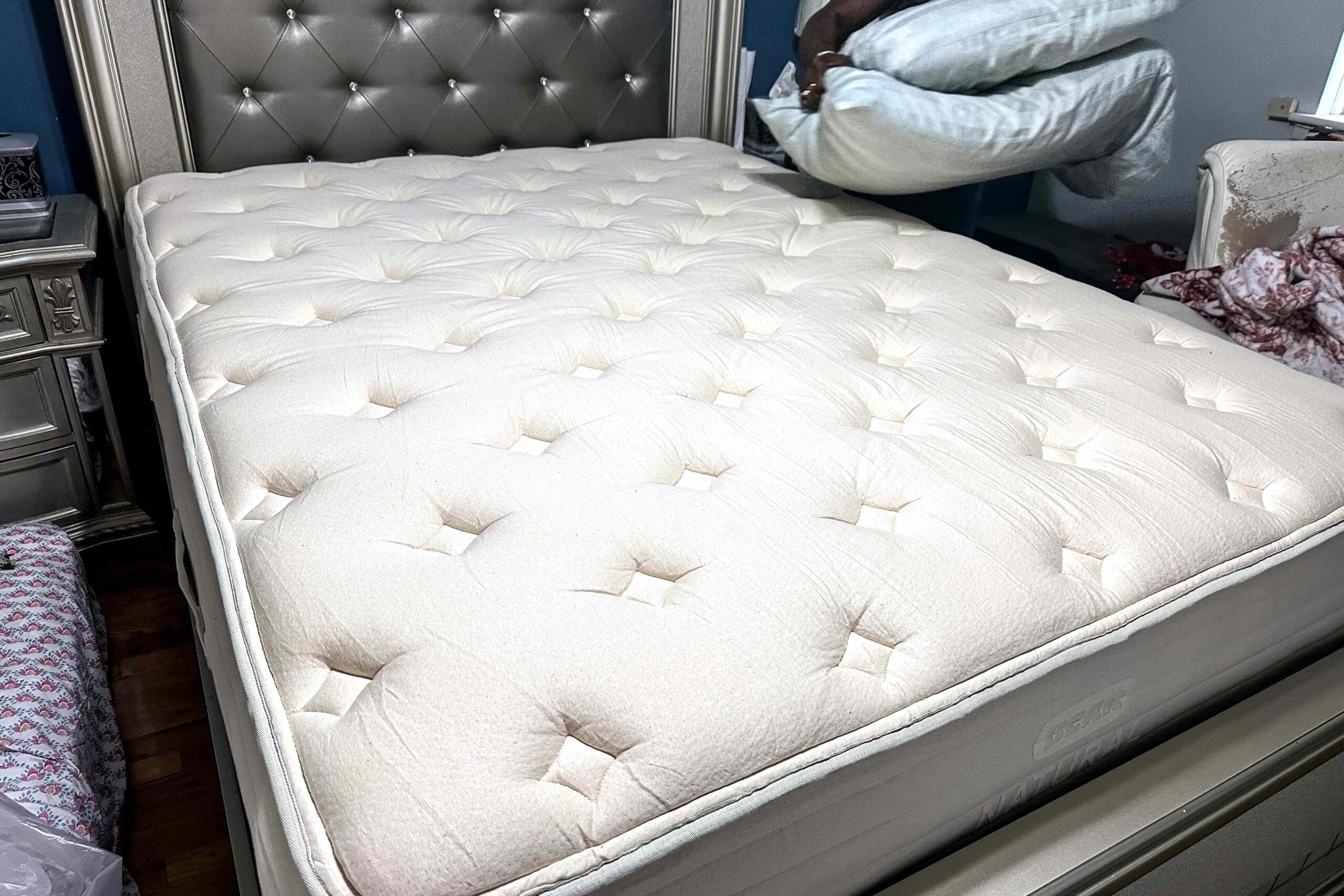There are many reasons why an organic mattress can be a great investment, including enhanced temperature regulation and eco-conscious designs, which are particularly beneficial for those with allergies.
We’ve been testing mattresses for over two years, and our main priority when evaluating them is always how well we slept on them. We’ve tested a handful of mattresses with organic certifications that will give you peace of mind while you snooze.
While there are many different certifications, we focused on the Global Organic Textile Standard, the Global Organic Latex Standard, and the Greenguard Gold certification because they cover the most commonly used materials in mattresses: cotton, latex, and foam.
What We Like
-
Works for back, side, and stomach sleepers
-
Excellent balance of pressure relief and support
-
Foam is surprisingly breathable
When it comes to organic mattresses, Saatva’s Zenhaven Latex Mattress is one of the most comfortable mattresses we’ve tested. It’s been our favorite pick in this category for the past year thanks to its breezy foam that doesn’t get hot overnight, and its dual-sided design, so you can pick a side that feels best to you.
This mattress is backed by five certifications—two specifically highlight the organic materials (GOTS & GOLS). And since it’s flippable, it’s an easy choice for any type of sleeper, and it’s a great option for those who may not know exactly what they need from a mattress.
We initially slept on the “luxury plush” side, but quickly realized that we sank in too much for our liking. The sinking-in feeling, however, can help if you’re a dedicated side sleeper, as it gives you pressure relief from that side’s bounce.
We think the “gentle firm” side is suitable for most sleepers and found it more comfortable when shifting positions at night without disturbing our partner. It’s also not overly firm, so you will still feel cushioned and supported as you lie down.
Best of all, hot sleepers should also stay comfortable throughout the night on this mattress because of the vented channels within its layers. We didn’t feel the foam layers holding onto body heat while we were sleeping, which is a common issue with foam.
While we’ve generally been impressed with the edge support in Saatva’s mattresses, this design does not have any dedicated edge support, so we’d advise you skip this one if you love hanging off the side. Additionally, if you know what type of mattress you want (soft, firm, or medium), you should skip this flippable design and select a mattress specifically advertised as such.
Mattress Type: Latex | Firmness: Luxury plush, gentle firm | Thickness: 10 inches | Sizes: Twin, twin XL, full, queen, king, split king, California king, upper-flex king | Certifications: GOTS, GOLS, eco-INSTITUT, GreenGuard Gold, Congress of Chiropractic State Association Seal of Approval | Trial Period: 365 nights
Credit:
The Spruce
What We Like
-
Noticeable edge support
-
Balanced feel
Nest’s The Owl Natural Latex Mattress is an excellent hybrid mattress choice because it’s available in three firmness levels, so you can find a firmness that matches how you sleep. While it says ‘organic,’ it doesn’t have any organic certifications to back that claim because not all of the materials are organic, which is a common issue with organic mattresses since there are so many parts.
The comfort foam layer within the mattress is CertiPur-US-certified for low VOC (volatile organic compounds) emissions, and the Talalay latex layer’s density is adjusted based on the mattress’s desired firmness. These layers create a responsive surface that we found very comfortable for side and back sleeping.
The coils in this mattress offer added edge support, making it easier to get out of bed in the morning (compared to the Saatva Zenhaven). However, we wish this mattress had a little more lumbar support; we found our hips sinking into its surface, like a gentle hug, more than we’d prefer.
While Saatva is our recommendation for anyone who wants the assurance of multiple certifications, Nest’s mattress is still a well-made option for anyone who may need something firmer than our best overall.
Mattress Type: Hybrid | Firmness: Plush, medium, or firm | Thickness: 13 inches | Sizes: Twin, twin XL, full, queen, king, California king, split king | Certifications: CertiPur-US | Trial Period: 365 nights
If the downsides of Nest’s The Owl Mattress are non-negotiable for you, then Bear’s Natural Latex Mattress is our recommendation. This mattress has even better edge support thanks to reinforced edge coils and zoned lumbar coils for extra support in the middle of the bed.
We were initially surprised by this bed’s firmness, given it’s described as a medium-feel mattress. However, we appreciated how the layers kept our spine better aligned. We never felt our hips sinking lower than our shoulders, and we even found ourselves sleeping more on our backs than we had with our previous mattress.
Similar to the Nest mattress, the organic cotton cover is not certified by a third party, which we recognized may be a deal breaker for some. However, the mattress is GreenGuard Gold and CertiPur-US certified for low VOC emissions.
We think dedicated side sleepers may find this mattress too firm because it doesn’t have as much cushioning in its upper layers. If you need a slightly softer mattress, our recommendations from Saatva and Nest are likely your best option.
Mattress Type: Hybrid | Firmness: Medium | Thickness: 13 inches | Sizes: Twin, twin XL, full, queen, king, California king, split king | Certifications: GreenGuard Gold, CertiPur-US | Trial Period: 120 nights
More Certified Organic Mattresses We Like
Although we haven’t had the chance to test many fully certified organic mattresses, there are plenty of excellent designs available. The Natural Escape Organic Mattress by My Green Mattress is a value-packed hybrid design particularly suited to back and side sleepers. It has pocketed coils—similar to those we loved in the Bear Natural—which offer localized lumbar support, keeping your hips aligned and cushioned.
Stomach sleepers need a firm surface to keep their spine completely neutral, and the all-foam design of the Earthfoam Organic Mattress makes it a great choice. Unlike the other options on our list that are composed of latex or memory foam, this mattress is actually made with natural rubber layers.
This rubber is even denser than latex but has the responsiveness of memory foam that so many sleepers love. Just be wary that this mattress is only 8.5 inches thick, so it will sit pretty low if you have a platform bed.
The Naturepedic EOS Classic Customizable Organic Mattress is a hybrid with a split interior that can be rearranged to cater to different firmness needs. The zippered design allows you and your partner to sleep on whatever bed softness you need. Lastly, the Birch by Helix Natural Mattress is another latex hybrid mattress to consider, but its cotton and wool layers are not backed by a GOTS certification.
How We Picked the Organic Mattresses
We’ve been testing mattresses for over two years, and while we’ve tested plenty of mattresses made with organic materials, not all of those mattresses are backed by third-party certifications.
We prioritized third-party certified organic mattresses we’ve tested and love because the certification process is lengthy and rigorous. These certifications verify that the entire mattress is made with high-quality, organic materials, so you can feel confident in your purchase.
The mattresses on our list that don’t have organic certifications to back their claims of using organic cotton likely are not made entirely with organic materials, so they do not qualify for the GOTS certification. However, they do still have CertiPur-US certifications for their foam layers.
Of course, all of the mattresses we’ve tested and recommend are comfortable despite months of use. They require no “break-in” period. We also included a few mattresses that we have not yet tested, but have similar features and layers to designs we have tested. They are also heavily certified for their organic composition.
How to Shop for an Organic Mattress
Know the Materials That Can Be Certified Organic
Not all mattresses can be certified organic because memory foams, coils, and proprietary fabrics (used for mattress covers) are not naturally occurring materials.
While your options for organic mattresses are more limited, you can still find great options from reputable bedding brands like Saatva and Nest. Latex, cotton, and wool are the most common organic mattress materials.
Understand Third-Party Certifications
As we mentioned above, receiving an organic certification is a rigorous process, so some mattresses that may include organic materials don’t always have a related certification. This is likely because not all parts of the mattress meet the requirements to carry a third-party label.
We recommend paying close attention to the information a mattress brand provides about its manufacturing process, in addition to looking for specific third-party certifications. Keep in mind that receiving a third-party certification is a voluntary process and not required, although it offers greater transparency to consumers.
Here are the most common organic certifications you’ll find associated with mattresses:
- Global Organic Textile Standard (GOTS): To carry this label, any textile product must be composed of a minimum of 70 percent certified organic textile fibers that are free from synthetic pesticides, herbicides, and GMOs.
- Global Organic Latex Standard (GOLS): To carry this label, a finished product must contain certified natural rubber latex and must be within certain limits for emissions and polymer or filler percentages.
Our top mattress on this list, the Saatva Zenhaven, is certified through these standards. While the Nest Owl Natural Latex Mattress and Bear Natural Latex Mattress both mention organic cotton, they do not have certifications for this information. However, both of these mattresses have a different third-party certification for their foam layers.
While these third-party certifications are not related to organic materials, they are equally important for understanding what’s in your mattress.
- GREENGUARD-Gold: A step up from the UL GREENGUARD certification, GREENGUARD-Gold limits emissions of more than 306 VOCs and must comply with the requirements of the California Department of Public Health Section 01350. This standard is considered more stringent than the CertiPUR-US standard, but the Bear Natural Mattress has both of these certifications.
- CertiPUR-US: This certification is for flexible polyurethane foams and specifies that the foam is made without formaldehyde, ozone depleters, prohibited phthalates, mercury, lead, other heavy metals, and additional chemicals classified as harmful to human health. Additionally, these foams must emit low levels of VOCs. Our hybrid pick, Nest’s The Owl Natural Latex Mattress, has this certification.
Select an Appropriate Firmness for Your Preferred Sleep Position
Once you’ve considered your third-party label priorities, the rest of the shopping experience is identical to shopping for any other mattress. We recommend paying close attention to any current pains you’re experiencing with your mattress and evaluating these in addition to how you like to sleep.
Stomach and back sleepers likely want firmer mattresses that will keep their spines aligned. Back sleepers will find hybrid mattresses, like the Bear Natural Mattress, comfortable to sleep on. The support from coils and cushioning from latex (and sometimes, foam) cradles the natural curve of the spine.
Additionally, all-foam designs like the Saatva Zenhaven can have a similar supportive, yet cushioned surface for back sleepers. However, stomach sleepers will want a firmer mattress to keep their spines neutral and prevent their hips from sinking too low. The Earthfoam Organic Mattress (in the firm feel) is our recommendation for stomach sleepers.
Side sleepers need extra pressure point relief, which pillowtop and hybrid mattresses can both offer. From our list, the Nest Owl Natural Latex Mattress is a great option for side sleepers. It’s a medium firmness that is a little softer than expected, and it has good edge support, too.
Why Trust The Spruce?
Emma Ashe is an editor at The Spruce specializing in bedding. She’s a combination sleeper, favoring her sides and stomach, and loves her Saatva mattress. Ashe has also written about organic sheets and has spent hours understanding the available certifications for organic textiles. She reviewed The Spruce’s relevant testing data to learn more about the organic mattresses our team has tested and included the best options that cater to a variety of sleep styles.








:max_bytes(150000):strip_icc()/owl-natural-latex-hybrid-mattress-16588b512ceb40e59628a3e6347b052c.jpg)
:max_bytes(150000):strip_icc()/bear-natural-mattress-f5aca27539a2406d800fbdb748e6efee.jpg)



